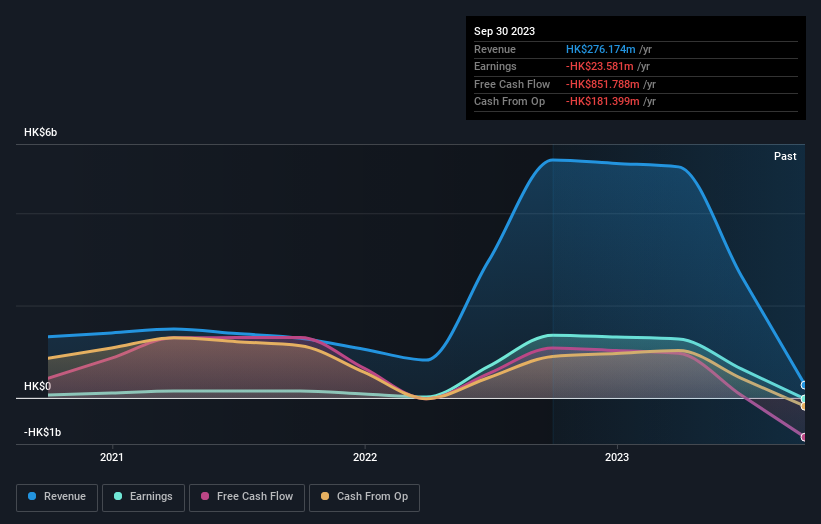Stock Analysis
- Hong Kong
- /
- Construction
- /
- SEHK:1271
After the recent decline, Grand Ming Group Holdings Limited (HKG:1271) Top Key Executive Hung Ming Chan's holdings have lost 12% of their value

Key Insights
- Significant insider control over Grand Ming Group Holdings implies vested interests in company growth
- The largest shareholder of the company is Hung Ming Chan with a 65% stake
- Ownership research, combined with past performance data can help provide a good understanding of opportunities in a stock
A look at the shareholders of Grand Ming Group Holdings Limited (HKG:1271) can tell us which group is most powerful. We can see that individual insiders own the lion's share in the company with 72% ownership. Put another way, the group faces the maximum upside potential (or downside risk).
And following last week's 12% decline in share price, insiders suffered the most losses.
Let's take a closer look to see what the different types of shareholders can tell us about Grand Ming Group Holdings.
See our latest analysis for Grand Ming Group Holdings

What Does The Lack Of Institutional Ownership Tell Us About Grand Ming Group Holdings?
Institutional investors often avoid companies that are too small, too illiquid or too risky for their tastes. But it's unusual to see larger companies without any institutional investors.
There could be various reasons why no institutions own shares in a company. Typically, small, newly listed companies don't attract much attention from fund managers, because it would not be possible for large fund managers to build a meaningful position in the company. Alternatively, there might be something about the company that has kept institutional investors away. Grand Ming Group Holdings might not have the sort of past performance institutions are looking for, or perhaps they simply have not studied the business closely.

Hedge funds don't have many shares in Grand Ming Group Holdings. Our data suggests that Hung Ming Chan, who is also the company's Top Key Executive, holds the most number of shares at 65%. When an insider holds a sizeable amount of a company's stock, investors consider it as a positive sign because it suggests that insiders are willing to have their wealth tied up in the future of the company. In comparison, the second and third largest shareholders hold about 7.5% and 0.1% of the stock. Note that two of the top three shareholders are also Chief Executive Officer and Member of the Board of Directors, respectively, once again pointing to significant ownership by company insiders.
While studying institutional ownership for a company can add value to your research, it is also a good practice to research analyst recommendations to get a deeper understand of a stock's expected performance. We're not picking up on any analyst coverage of the stock at the moment, so the company is unlikely to be widely held.
Insider Ownership Of Grand Ming Group Holdings
While the precise definition of an insider can be subjective, almost everyone considers board members to be insiders. Management ultimately answers to the board. However, it is not uncommon for managers to be executive board members, especially if they are a founder or the CEO.
Insider ownership is positive when it signals leadership are thinking like the true owners of the company. However, high insider ownership can also give immense power to a small group within the company. This can be negative in some circumstances.
Our most recent data indicates that insiders own the majority of Grand Ming Group Holdings Limited. This means they can collectively make decisions for the company. Given it has a market cap of HK$4.2b, that means they have HK$3.1b worth of shares. Most would argue this is a positive, showing strong alignment with shareholders. You can click here to see if those insiders have been buying or selling.
General Public Ownership
The general public-- including retail investors -- own 28% stake in the company, and hence can't easily be ignored. While this group can't necessarily call the shots, it can certainly have a real influence on how the company is run.
Next Steps:
I find it very interesting to look at who exactly owns a company. But to truly gain insight, we need to consider other information, too. Case in point: We've spotted 2 warning signs for Grand Ming Group Holdings you should be aware of.
If you would prefer check out another company -- one with potentially superior financials -- then do not miss this free list of interesting companies, backed by strong financial data.
NB: Figures in this article are calculated using data from the last twelve months, which refer to the 12-month period ending on the last date of the month the financial statement is dated. This may not be consistent with full year annual report figures.
Valuation is complex, but we're helping make it simple.
Find out whether Grand Ming Group Holdings is potentially over or undervalued by checking out our comprehensive analysis, which includes fair value estimates, risks and warnings, dividends, insider transactions and financial health.
View the Free AnalysisHave feedback on this article? Concerned about the content? Get in touch with us directly. Alternatively, email editorial-team (at) simplywallst.com.
This article by Simply Wall St is general in nature. We provide commentary based on historical data and analyst forecasts only using an unbiased methodology and our articles are not intended to be financial advice. It does not constitute a recommendation to buy or sell any stock, and does not take account of your objectives, or your financial situation. We aim to bring you long-term focused analysis driven by fundamental data. Note that our analysis may not factor in the latest price-sensitive company announcements or qualitative material. Simply Wall St has no position in any stocks mentioned.
About SEHK:1271
Grand Ming Group Holdings
An investment holding company, engages in the building construction, property leasing, and property development businesses in Hong Kong.
Second-rate dividend payer with worrying balance sheet.


